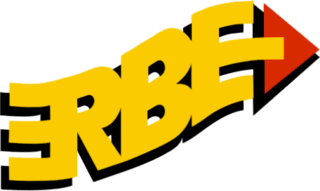Erbe Software
From Sega Retro
This teeny-tiny article needs some work. You can help us by expanding it.
Erbe Software was a Spanish home computer software publisher founded in 1984 by Peter Bagney and Paco Pastor, the latter being a singer from the Formula V band who came from the discographic business and later on would become president of Sega Consumer Products S.A. (Spanish division of Sega Europe).
One of the largest Spanish publishing companies during the eighties and nineties, they were pioneers in the Spanish videogame market industry by cutting their software prices on more than a half the recommended price so they could combat the ravaging piracy in the country. This made the company grow into the biggest Spanish home computer software publisher between 1989 and 1995, when they controlled more than 50% of the videogame publishing business in Spain, greatly investing in both marketing strategies and also the localization of foreign titles into Spanish language.
It was then when they also expanded their business to home consoles, co-distributing Sega products in Spain for a short period, until the establishment of the Spanish division of Sega Europe in 1991. Later on, they also did the same with Nintendo products. In early 1993, an arson destroyed one of their warehouses in Mostoles, Madrid, resulting in a complete loss of many manufactured consoles and games from the Japanese company, subsequently prompting to break relationships with Erbe and establishing their Spanish publishing division.
Erbe then stayed mostly as a home computer market publisher as it was in their beginnings, struggling to keep a fierce competition from both rival companies like Proein and the Spanish divisions of big multinational companies like Electronic Arts and Virgin Interactive. It was in 1998, when they lost the rights to distributing LucasArts titles in Spain to Electronic Arts, when the company suffered a big decline and ended up being acquired by Anaya Interactiva, who liquidated the brand and sold most of its assets to the then known as Havas Interactive, which later on became Vivendi Entertainment until their merging with Activision. [1] [2]
Contents
Softography
Commodore 64
- Spy Hunter (1984)
- Thunder Blade (1988)
- Desolator (1988)
- Cyber Police ESWAT (1990)
- OutRun Europa (1991)
- Bonanza Bros. (1992)
IBM PC
- OutRun (1989)
- Thunder Blade (1989)
Amstrad CPC
- OutRun (1987)
- Thunder Blade (1988)
- Turbo OutRun (1989)
- Crack Down (1990)
- Alien Storm (1991)
ZX Spectrum
- Spy Hunter (1985)
- OutRun (1987)
- Desolator (1988)
- Thunder Blade (1988)
- Turbo OutRun (1989)
- Crack Down (1990)
- Cyber Police ESWAT (1990)
- Sega Master Mix (1990)
- Bonanza Bros. (1991)
- OutRun Europa (1991)
MSX
- Thunder Blade (1989)
- OutRun (19xx)
Amiga
- OutRun (1988)
